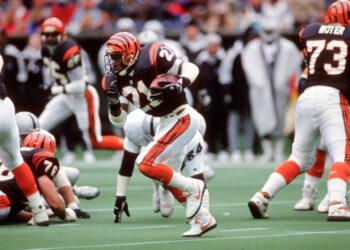When news broke that flag football would be added to the Olympic Games in Los Angeles in 2028, speculation ran wild about which NFL stars might don the red, white, and blue. At the top of that fantasy roster for many fans was Kansas City Chiefs quarterback Patrick Mahomes. His unmatched combination of skill, creativity, and charisma seemed like the perfect fit for a sport designed to showcase agility and finesse over brute strength. However, Mahomes recently tempered expectations by announcing that he would not participate in the Olympic competition, stating he’ll “leave it to the younger guys.”
Mahomes’ decision has sparked a range of reactions from fans and analysts. While some were disappointed at the thought of missing out on watching the NFL’s most electric quarterback on the global stage, many understood — and even applauded — his choice. After all, by 2028, Mahomes will be 32 years old and likely deep into what could be his second decade in the NFL. With an eye toward legacy and longevity, he’s choosing to prioritize his professional career over a brief Olympic detour.
Strategic Priorities and Longevity
Mahomes’ decision isn’t just about age — it’s about managing the wear and tear on his body and maintaining peak performance for the NFL season. Unlike traditional Olympic sports, which athletes train their entire lives for, flag football is still finding its identity in the international arena. For Mahomes, the Olympic competition, while prestigious, doesn’t hold the same weight as another potential Super Bowl ring or MVP award.
NFL careers are notoriously short, especially for quarterbacks who play with Mahomes’ high level of mobility. Even though he’s proven to be remarkably durable, missing time — or risking injury — for a non-NFL event is a gamble few franchise quarterbacks can afford. His massive contract with the Chiefs, which includes up to $450 million in total value, also speaks to the weight of his responsibility as the face of the franchise. Simply put, Kansas City’s Super Bowl hopes depend on Mahomes being healthy and available each season.
Supporting the Next Generation
By “leaving it to the younger guys,” Mahomes is also signaling his support for the next generation of athletes. The Olympics provide a unique platform for rising stars, especially those who might not yet be in the NFL or are still making a name for themselves. Rather than overshadowing them, Mahomes is stepping aside to give these athletes their moment.
This self-awareness is consistent with Mahomes’ leadership style. Despite his superstar status, he’s often praised for his humility and team-first mindset. In interviews, he consistently emphasizes the collective over the individual, and his approach to the Olympics is no different. While fans may dream of a Team USA loaded with NFL talent, the opportunity to shine should go to players who have more to gain from the exposure and experience.
The Evolution of Flag Football
Flag football’s inclusion in the Olympics represents a major step forward for the sport. It has long been a popular recreational activity, but the Olympic spotlight will elevate it to a new level of visibility and legitimacy. The format — non-contact, fast-paced, and skill-driven — is well-suited to global audiences and may serve as an accessible gateway to American football for countries with less established programs.
Mahomes’ decision doesn’t diminish the excitement surrounding flag football’s Olympic debut. If anything, it reinforces that the sport is about more than just star power. For USA Football and the NFL, developing a roster of dedicated flag football athletes — possibly drawing from college stars, semi-professional leagues, or standout youth programs — will help build the foundation for a more sustainable and competitive international sport.
Looking Ahead
While Mahomes won’t be suiting up for Team USA in 2028, his presence will still loom large. As one of the most influential athletes of his generation, his comments draw attention to the Olympics and help validate the sport’s inclusion. He’s likely to be involved in promoting the event, mentoring young players, or even serving as an ambassador — roles that allow him to contribute without stepping onto the field.
For fans, the dream of watching Mahomes dominate Olympic flag football may not become reality, but his decision reflects a thoughtful and mature approach to career management. Rather than chasing every accolade, Mahomes is focused on where he can make the biggest impact. And for the younger guys who do take the field in 2028, they’ll do so with the endorsement — and inspiration — of one of the game’s all-time greats.
In the end, Mahomes’ choice is less a farewell and more a passing of the torch — a reminder that every new sport or stag
e needs its own rising stars.











